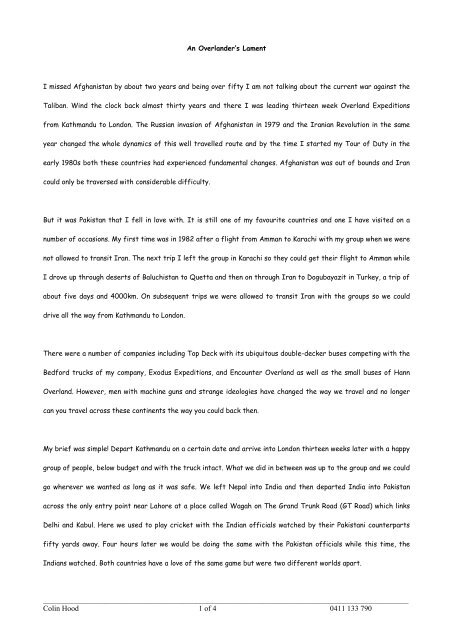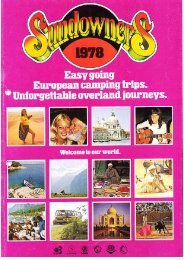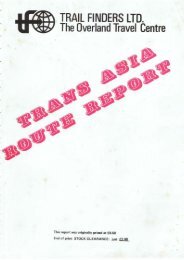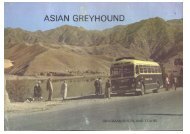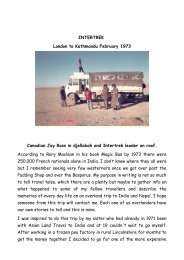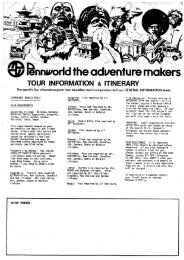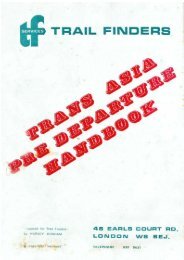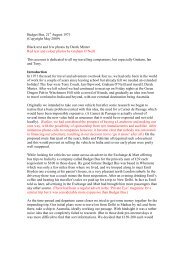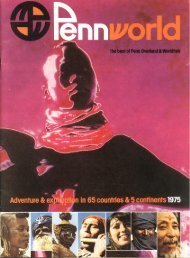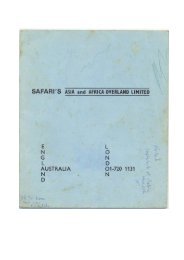story - India Overland with Swagman Tours
story - India Overland with Swagman Tours
story - India Overland with Swagman Tours
You also want an ePaper? Increase the reach of your titles
YUMPU automatically turns print PDFs into web optimized ePapers that Google loves.
An <strong>Overland</strong>er’s Lament<br />
I missed Afghanistan by about two years and being over fifty I am not talking about the current war against the<br />
Taliban. Wind the clock back almost thirty years and there I was leading thirteen week <strong>Overland</strong> Expeditions<br />
from Kathmandu to London. The Russian invasion of Afghanistan in 1979 and the Iranian Revolution in the same<br />
year changed the whole dynamics of this well travelled route and by the time I started my Tour of Duty in the<br />
early 1980s both these countries had experienced fundamental changes. Afghanistan was out of bounds and Iran<br />
could only be traversed <strong>with</strong> considerable difficulty.<br />
But it was Pakistan that I fell in love <strong>with</strong>. It is still one of my favourite countries and one I have visited on a<br />
number of occasions. My first time was in 1982 after a flight from Amman to Karachi <strong>with</strong> my group when we were<br />
not allowed to transit Iran. The next trip I left the group in Karachi so they could get their flight to Amman while<br />
I drove up through deserts of Baluchistan to Quetta and then on through Iran to Dogubayazit in Turkey, a trip of<br />
about five days and 4000km. On subsequent trips we were allowed to transit Iran <strong>with</strong> the groups so we could<br />
drive all the way from Kathmandu to London.<br />
There were a number of companies including Top Deck <strong>with</strong> its ubiquitous double-decker buses competing <strong>with</strong> the<br />
Bedford trucks of my company, Exodus Expeditions, and Encounter <strong>Overland</strong> as well as the small buses of Hann<br />
<strong>Overland</strong>. However, men <strong>with</strong> machine guns and strange ideologies have changed the way we travel and no longer<br />
can you travel across these continents the way you could back then.<br />
My brief was simple! Depart Kathmandu on a certain date and arrive into London thirteen weeks later <strong>with</strong> a happy<br />
group of people, below budget and <strong>with</strong> the truck intact. What we did in between was up to the group and we could<br />
go wherever we wanted as long as it was safe. We left Nepal into <strong>India</strong> and then departed <strong>India</strong> into Pakistan<br />
across the only entry point near Lahore at a place called Wagah on The Grand Trunk Road (GT Road) which links<br />
Delhi and Kabul. Here we used to play cricket <strong>with</strong> the <strong>India</strong>n officials watched by their Pakistani counterparts<br />
fifty yards away. Four hours later we would be doing the same <strong>with</strong> the Pakistan officials while this time, the<br />
<strong>India</strong>ns watched. Both countries have a love of the same game but were two different worlds apart.<br />
________________________________________________________________________________________________<br />
Colin Hood 1 of 4 0411 133 790
After crossing the border we camped in the gardens of relatively large hotel while we explored some of the<br />
wonders left behind by the Moghuls. After Lahore we would drive along the GT Road to Peshawar stopping in<br />
Rawalpindi for a few days as well as visiting historic towns such as Taxila and Attock.<br />
We were self-sufficient and could camp anywhere. In the cities we camped in the grounds of hotels popular <strong>with</strong><br />
westerners (ones now targeted by suicide bombers) while in the countryside we either wild camped or put up our<br />
tents in the grounds of a Government Rest House. Our group size ranged from eight to twenty five and there were<br />
always two staff, a leader/driver and a co-driver who was usually a trainee learning the route. At present Pakistan<br />
may appear to be unstable but in the early eighties it was relatively stable.<br />
Peshawar was as far as we could go on the GT Road. Beyond was the Kyber Pass into Afghanistan and before 1979,<br />
overland expeditions could continue through the Kyber to Kabul and onto to Iran. On one of my trips I was able to<br />
obtain permission to drive up to the top of the Pass to a place called Landi Kotal where we could look down into<br />
Afghanistan. I’m sure Alexander the Great didn’t have the same problems crossing borders on his epic journey!<br />
Anyway to safeguard us and make sure we came back, we travelled <strong>with</strong> a couple of armed soldiers as our escorts.<br />
This was a very nostalgic time for me after having seen movies and read many books on this historic area.<br />
One of my passions is mountains and one of the highlights of Pakistan was driving up the beautiful Swat Valley<br />
where we camped in pine forests below snow covered peaks and enjoyed massive beef patties and cups of chai <strong>with</strong><br />
very friendly and curious locals. This paradise was in the news last year as it was the scene of an all-out assault by<br />
the Pakistan army trying the rid the area of the Taliban which had taken over the valley as its base.<br />
Another highlight to me was the drive up the Karakorum Highway (KKH) from Rawalpindi. I only did this once<br />
during this time but seventeen years later I would be back here on a bicycle. It is a potentially dangerous drive<br />
along narrow twisty roads through some of the most stunning mountain scenery to a town called Gilgit. Here I<br />
stopped as the road further north was not possible for political reasons. However some of the group managed to<br />
hire a few taxis and went up the paradise of Hunza. We were only in Gilgit for one night before we had to leave<br />
rather quickly due to some political unrest. As we were self sufficient, we camped out of town and out of sight.<br />
Each trip was different and there just wasn’t enough time to drive up both the Swat and the KKH.<br />
________________________________________________________________________________________________<br />
Colin Hood 2 of 4 0411 133 790
To get to the Iran border at Taftan we had to retrace the GT Road to Lahore before heading south to Multan<br />
where we had two choices. We could either head across the deserts of Baluchistan toward Quetta (an old British<br />
Hill Station and now headquarters of the Taliban) or keep going south through the Punjab and Sind provinces to<br />
Karachi. Driving to Karachi was only necessary if the group had to fly over Iran but as there was no direct road<br />
from Karachi to Quetta we had to retrace most of our route back up north before going on to Quetta. If we did<br />
have to drive to Karachi we had the chance to visit Moenjodaro, the 4000 year old city of the Harradan culture<br />
and one of the oldest civilisations in the world. Luck often plays a part in our lives and during one stay in Karachi<br />
some of the group were able to watch a day of a test match before having drinks <strong>with</strong> the Australian team.<br />
Between Quetta and the Iran border was some 500kms of the most beautiful and desolate areas of the trip. This<br />
was one of the worst driving sections of all and the road was so potholed and washed away in sections that I was<br />
forced to drive on the sand. In fact the sand provided us <strong>with</strong> one of the best road surfaces outside of Europe<br />
and as long as I kept the "road" in sight I couldn’t get lost.<br />
Since ending my stint as a tour leader I have returned three times to Pakistan, twice on a bicycle and once to<br />
climb a mountain. The first time on a bike was part of a greater trip from Edinburgh to Sydney in 1985 where a<br />
friend and I cycled along the same route from the Iran border to Quetta past many new Afghan refuges camps.<br />
However from Quetta to Lahore we decided to follow a more remote and scenic route, more commonly known as<br />
the Robber’s Road through villages such as Lorelei and Ziarat (2600m). All we encountered were friendliness and<br />
amazement. The villagers may still be the same but unfortunately outside forces are changing the way they live.<br />
The second time on the bike it was down the Karakorum Highway (KKH) <strong>with</strong> five friends in 1999 from Kashgar in<br />
China to Islamabad in Pakistan. The frontier is at 4730 metres <strong>with</strong> immigration and customs nearly a hundred<br />
kilometres either side. Probably the most desolate and highest border crossing I have ever been through. Chinese<br />
formalities were two days before the pass and the Pakistani ones were a day downhill. This meant that we had<br />
cycled for three days through a no-man’s land of stony deserts, high mountains, and no human habitation. I hear it<br />
is no longer possible to cycle through this no-man’s land.<br />
________________________________________________________________________________________________<br />
Colin Hood 3 of 4 0411 133 790
The last time was in July 2001 when four of us flew into Lahore before taking the bus to Islamabad where we<br />
changed onto another bus for the long journey up the KKH and over the border to attempt to climb a mountain<br />
called Mustagh Ata in China. I also find it very nostalgic thinking of bygone times and people I travelled <strong>with</strong> but<br />
the scenery never changes. My times in this part of Pakistan are more treasured than in any other part of the<br />
world I have travelled through.<br />
Earlier this year a friend of mine organised a reunion of the many <strong>Overland</strong>ers, leaders, drivers and couriers,<br />
living in Australia. It was not possible to get hold of everyone and it was an eclectic bunch of people who<br />
reminisced about the good old days. Those older than me would say the 1970s were the best times and I’m sure<br />
Marco Polo would not recognise the Silk Road now. The <strong>Overland</strong> trail of the 1970s and 1980s may never be the<br />
same again but I do hope that one day you can enjoy Pakistan the way I have and let’s hope there will be peace<br />
soon.<br />
________________________________________________________________________________________________<br />
Colin Hood 4 of 4 0411 133 790


